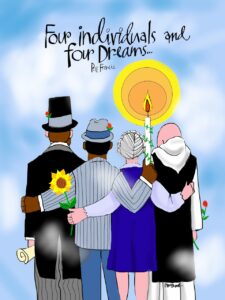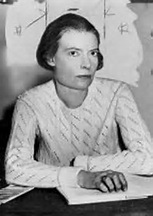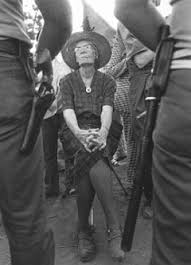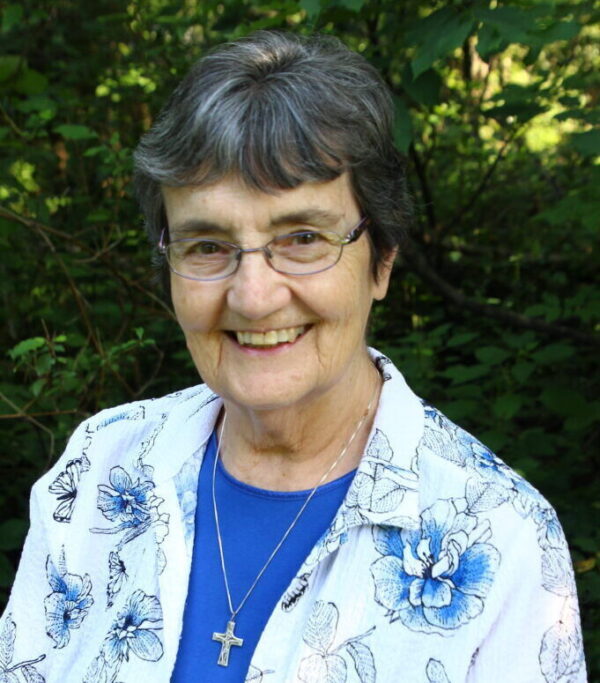In his address to the U.S. Congress last September, Pope Francis referred to four exemplary Americans. One of them was Dorothy Day. Currently she is up for canonization, something that at one time would have seemed impossible. After all, Dorothy lived with a man out of wedlock, had an abortion, drank a lot, was labeled a communist and an anarchist, was shot at, was jailed four times, and was repeatedly investigated by the FBI. Is this the “stuff” of sanctity? To answer that question, let’s take a closer look at this remarkable woman.
Dorothy was born in 1897 in Brooklyn to a nominally Episcopalian family. Her father, a newspaperman,

moved the family to Chicago due to his job. Dorothy attended the University of Illinois, but she quit after a couple of years and moved back to New York City. There she adapted a bohemian life style in Greenwich Village, writing for radical newspapers and participating in a variety of social and political protests. Her first arrest came in 1917 when she took part in a suffragist protest in front of the White House.
A casual sexual affair resulted in her first pregnancy. She had an abortion, a decision she later deeply regretted. In the 1920’s she fell in love with Foster Batterham, an anarchist, and became his common-law-wife. When she became pregnant again, she was grateful for this “second chance” to bring a new life into the world. Simultaneously, she began reading Christian classics and was eventually drawn to the Catholic Church. But Batterham had no use for organized religion. He basically told her to choose: either him or her new-found faith. Dorothy chose her Catholic faith and Batterman left, causing her immense pain.
For Dorothy continued to love Batterham. Once she wrote to him: “I was very cold last night. Not because there wasn’t enough covers but because I didn’t have you.” Even five years after they had parted she was still pleading with him to come back, marry her, and be a father to their daughter, Tamar. But he never did. (For more details, read Dorothy’s inspiring autobiography, The Long Loneliness.)

In 1932 Dorothy providentially met Peter Maurin, a French itinerant philosopher who soon became her mentor. With Peter’s encouragement, Dorothy founded a newspaper, the Catholic Worker, that blended her talent for writing with her devotion to social justice. The first issue came out fittingly on May 1, 1933, the Feast of Joseph the Worker. It sold for a penny—as it still does today. The first issue sold 2500 copies, but by year’s end the circulation was 100,000. At the same time, Dorothy and Peter opened houses of hospitality for the poor in New York City and elsewhere, providing food and shelter especially for the homeless. Dorothy lived in one of these houses, writing, running the newspaper, welcoming visitors, talking to volunteers, organizing meetings, and (of course) praying.
Throughout her long life Dorothy was a woman of prayer. Daily she attended Mass, read the scriptures, prayed part of the Divine Office, and said the rosary. She also lived voluntary poverty, wearing only donated clothing, traveling by bus, and having very few possessions. She never claimed tax-exempt status for the Catholic Worker saying, when you give to the poor, it should be done without getting a tax write-off in exchange. She was also a tireless advocate for peace and often protested against war and later against nuclear armaments.

In 1973, at age 76, she was arrested again for her participation in a United Farm Workers rally, supporting Caesar Chavez and the rights of migrant workers.
Dorothy never romanticized working and living with the poor. At times she struggled with some of the individuals who came to the Catholic Worker for help or to volunteer. But she continuously strove to see Christ in everyone she met. Dorothy experienced personal trials as well. A particular sadness for her was that both Tamar and her children eventually drifted away from the Church. As sickness and old age began to wear on Dorothy, she was largely confined to her room at the Catholic Worker, saying, “My job is prayer.” She died on November 29, 1980 at the age of 83.
Dorothy Day combined the practice of charity with the call for justice. Although she admired the saints who devoted themselves to helping the poor, she raised the question: “Where were the saints to try to change the social order, not just minister to the slaves, but to do away with slavery?” Robert Ellsberg, who wrote All the Way to Heaven: The Selected Letters of Dorothy Day, says of Dorothy: “Her life was a living parable, focused on what she called the mystery of the poor: ‘that they are Jesus, and what we do for them we do to Him.'”
Dorothy worked tirelessly for peace. This song, therefore, seems appropriate for her. It is the prayer of St. Francis of Assisi, “Make Me a Channel of Your Peace” sung here by Susan Boyle.
Does anything stand out for you about the life of Dorothy Day?
In whom do you struggle to see the face of Christ?
Are you combining the practice of charity with the call for justice in your own personal life?
PS: If you did not full out my survey last week, here it is again:






18 Responses
Sr. Melannie,
The life of Dorothy Day rings true for me because she often struggled yet kept moving forward in her walk with Jesus. It gives me hope that all the twists and turns in life can still be holy.
Happy 2016!
Kathleen
Thank you Sr Melannie, for always giving great reflections to ponder. 🙂
Several years ago my brother sent me a copy of Dorothy Day’s autobiography. What a life she had! Thankfully she became a faithful daughter of God’s and gives us all a great deal of hope and love. Thank you for this lovely article.
Mary
Sr. Melannie
The line that stood out for me was: when you give to the poor, it should be done without getting a tax write-off in exchange. I think
most people take the allowed tax write-off for donations of food,
clothing, and money. This is a good reflection on giving out of love
and not expecting some personal benefit in return.
I look forward to your posts each Monday. It starts my week off on
a positive note. Thank you for all your good work.
Carol
Wonderful insights into the life of Dorothy Day. And her work continues today with the Catholic Worker and her views on social justice. I learn, pray, and become more aware of my world through your blog. Thank you for touching my life in a positive way.
Happy New Year!
My favorite song/prayer and never better sung than by Susan Boyle, who herself has quite a story. Thank you for the blog about Dorothy Day.
What a woman! What a life! What a role model! Dorothy Day left this world a better place. Thank you, Sister Melannie.
I still struggle with whether or not to give money to the street beggars, who most people consider addicts, etc. does anyone have words of advice, wisdom?
Thank you, Sister.
You are a real presence of Christ. Your so down to earth and help me to accept the challenge of daily living. Thank you!
Dorothy Day struggled as we all do but gave up everything for her Catholic faith. She gave her whole life to the poor. Amazing…..and what more can I be doing?
Thank you for the richness if your blogs you share with us Melannie. I truly am grateful for the added music and Youtube graphics of pictures .
Very enriching. Thank you so much!
In response to Diane re: giving to people on the street. I’ve decided it’s none of my business what they do with what I give them. If that little bit of human connection makes them feel better that’s OK. If homeless people are standing outside of stores begging I ask if I can get them something from inside and they always respond gratefully. Again it gives them some contact with another person.
Thank you, Kathleen. What you said makes a lot of sense…not that giving to others in love and faith makes sense. I started giving mostly every time I saw a street person since this fall, but my husband thinks it’s crazy…and I haven’t yet explained how important it is to me. So I only give when I am alone.
With the multitude of injustices, I find it hard to focus on one or two. But it takes focus to move forward.
I pray for focus.
I read THE DUTY OF DELIGHT and was amazed that she remained true to her Catholic faith despite the many times she was disillusioned by its representatives and often held in poor regard by it.
I also was impressed that, while living where she worked and where she sheltered the needy, Dorothy also knew when to seek the solace of the seashore and the companionship of friends.
Sister, I most struggle to see the face of Christ when I look into my mirror. Thanks for your weekly inspirations. Stan
Hi Melannie,
I’m answering in the 11th hour….it’s been a hectic week.
Dorothy Day has always been someone I admired…her life was unbelievable. She has done so much good…how can we judge some of her mistakes?
I especially like her because she spent a lot of time on Staten Island…and is buried in the same cemetery as our sisters.
I pray for her canonization!
Blessings for a happy, healthy New Year. Josita